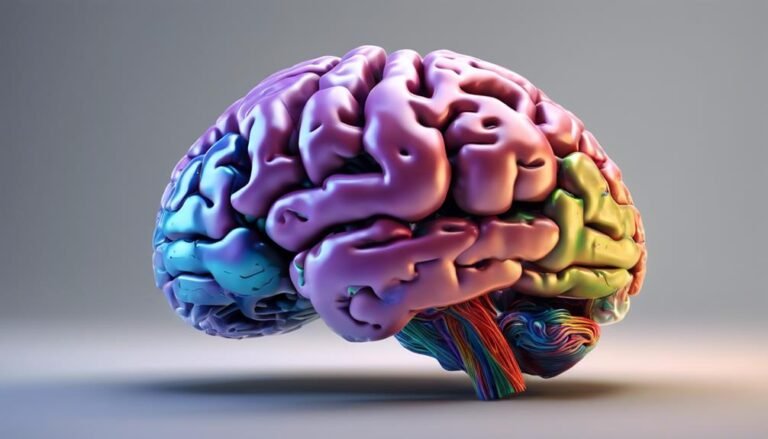Freud’s Defense Mechanisms
Imagine the intricate web of your mind, intertwining mechanisms that shield you from distress and uncertainty. Freud's Defense Mechanisms offer a glimpse into the complexities of human behavior, revealing how we navigate through challenging emotions and experiences. Delving into these defense mechanisms may shed light on your own patterns of coping and provide insights into the underlying motivations driving your actions. By exploring these psychological strategies, you might uncover hidden truths about yourself and those around you, leading to a deeper understanding of the human psyche.
Key Takeaways
- Repression involves unconscious forgetting for shielding from distressing thoughts.
- Denial refuses uncomfortable truths temporarily, hindering growth if prolonged.
- Projection blames others to avoid responsibility and hinder introspection.
- Displacement redirects emotions to alleviate pressure; addressing the root cause is crucial.
- Sublimation copes through creative channels, managing emotions constructively.
Freud's Theory of Defense Mechanisms
Freud's theory of defense mechanisms outlines the unconscious strategies individuals employ to protect themselves from anxiety and emotional distress. These coping mechanisms, deeply rooted in Freudian theory, shed light on how subconscious behavior influences our responses to challenging situations.
One of the fundamental defense mechanisms identified by Freud is repression, where distressing thoughts are pushed into the unconscious to prevent conscious awareness of painful memories or desires. This psychological defense mechanism acts as a shield, shielding the individual from overwhelming emotions that could otherwise lead to psychological turmoil.
Freud believed that these defense mechanisms operate without our conscious awareness, shaping our behaviors, thoughts, and feelings in subtle yet impactful ways. By understanding these processes, individuals can gain insight into why they respond to stressors in specific ways.
Through recognizing and acknowledging these defense mechanisms, individuals can begin to unravel the complexities of their subconscious behavior and work towards healthier coping strategies. Freud's exploration of defense mechanisms remains a cornerstone in understanding human behavior and the intricate ways individuals protect themselves from emotional harm.
Repression: The Unconscious Forgetting
In the domain of psychological defense mechanisms, repression stands out as a process of unconscious forgetting that shields individuals from distressing thoughts and emotions. Unconscious memories that are deemed too painful or threatening are suppressed by the mind through repression, a mechanism proposed by Sigmund Freud.
This mental suppression allows individuals to avoid confronting traumatic experiences or desires that may cause anxiety or inner conflict. Repression operates by pushing unacceptable thoughts or memories into the unconscious, where they remain hidden from awareness.
By burying these distressing memories deep within the psyche, individuals can continue their daily lives without being overwhelmed by the associated emotions. However, despite being hidden from consciousness, these repressed memories can still influence behavior and mental health.
It is essential to recognize that while repression may provide temporary relief from emotional distress, unresolved issues can resurface in various ways, impacting psychological well-being. Understanding the role of repression in shaping unconscious processes can aid in unraveling complex emotional responses and behaviors.
Denial: Refusing to Accept Reality
Denial, a defense mechanism observed in psychological contexts, involves the refusal to acknowledge or accept certain aspects of reality. It's a coping mechanism that individuals often employ to shield themselves from uncomfortable truths or situations.
In denial, there's a psychological resistance to facing facts that may be distressing or challenging. This can manifest in various ways, such as denying a medical diagnosis, refusing to accept the end of a relationship, or disregarding evidence that contradicts one's beliefs.
Denial serves as a temporary shield against reality, providing individuals with a sense of emotional protection. However, relying on denial as a long-term coping strategy can hinder personal growth and prevent individuals from addressing underlying issues.
It's essential to recognize when denial is being used as a defense mechanism and to seek healthier ways of processing and dealing with difficult truths. By acknowledging and confronting reality, individuals can move towards greater self-awareness and emotional well-being.
Projection: Blaming Others
When employing projection as a defense mechanism, individuals tend to blame others for their own thoughts, feelings, or actions. Blame shifting is a common behavior associated with projection, where individuals avoid taking responsibility for their own shortcomings by attributing them to someone else.
By projecting their negative traits onto others, individuals create a psychological distance between themselves and their faults, allowing them to maintain a positive self-image. This defense mechanism can lead to conflicts in relationships, as the individual may constantly accuse others of behaviors they're unwilling to acknowledge in themselves.
Projection often stems from a deep-seated fear of facing one's own flaws or insecurities. By projecting these undesirable qualities onto others, individuals can temporarily alleviate their feelings of guilt or shame. However, this temporary relief comes at the cost of genuine self-reflection and personal growth.
Ultimately, projection and blame shifting serve as barriers to introspection and hinder the individual's ability to address their own issues constructively.
Displacement: Redirecting Emotions
Individuals often employ displacement as a defense mechanism to redirect their emotions from a source that triggers discomfort to a more acceptable target. This coping mechanism involves transferring feelings, such as anger or frustration, from the original cause to a substitute target that's perceived as less threatening. By engaging in emotional redirection, individuals can temporarily alleviate the pressure of dealing directly with the intense emotions associated with the initial trigger.
Displacement can manifest in various ways in daily life. For instance, a person who's upset with their boss but can't express their feelings may go home and release their pent-up emotions on family members or friends. In this scenario, the individual is displacing their anger from the workplace onto a safer outlet.
While displacement may provide temporary relief, it's essential to address the root cause of the emotions to prevent ongoing issues.
Understanding displacement as a defense mechanism sheds light on how individuals navigate complex emotional experiences through coping strategies. By recognizing these patterns, individuals can work towards healthier ways of processing and expressing their emotions, leading to improved overall well-being.
Sublimation: Channeling Negative Energy
When faced with negative energy, sublimation offers a unique perspective on transforming it into something positive.
By channeling negative impulses into constructive outlets, individuals can find a creative way to express and manage their emotions.
This process not only redirects harmful tendencies but also fosters personal growth and self-awareness.
Positive Energy Transformation
Sublimation, a defense mechanism outlined by Freud, involves the transformation of negative energies into socially acceptable and productive outlets. This process allows individuals to channel their inner conflicts and impulses into creative or constructive activities, leading to personal growth and positive energy transformation.
By redirecting negative emotions or desires into pursuits such as art, music, sports, or volunteer work, individuals can harness their energy in ways that benefit both themselves and society.
Through sublimation, individuals can find a sense of fulfillment and achievement, turning what could be destructive emotions into sources of inspiration and motivation. This transformation not only helps in coping with internal struggles but also enhances overall well-being.
Redirecting Negative Impulses
By channeling negative impulses through sublimation, you can effectively convert destructive energies into constructive and socially acceptable outlets. Sublimation, a defense mechanism identified by Freud, involves redirecting negative impulses into activities that are positive and beneficial. This process allows individuals to cope with difficult emotions by channeling them into creative or productive pursuits, thereby promoting emotional regulation.
When faced with challenging feelings such as anger or frustration, sublimation offers a way to manage these emotions constructively. Instead of expressing these negative impulses in harmful ways, individuals can harness them to drive creative endeavors or engage in activities that benefit themselves and others. By transforming destructive energies into productive outlets, individuals can maintain emotional balance and prevent the escalation of negative emotions.
In essence, sublimation serves as a valuable coping strategy for redirecting negative impulses towards activities that promote personal growth and well-being. Through this process, individuals can effectively manage their emotions and cultivate a sense of empowerment over their internal experiences.
Creative Outlet for Emotions
Channeling negative energy through creative outlets offers a constructive way to transform challenging emotions into productive endeavors.
Engaging in activities like art therapy or journaling allows you to express and process difficult feelings in a healthy manner. Art therapy, for instance, provides a non-verbal means of communication, enabling you to explore emotions that may be hard to articulate verbally. By channeling negative energy into artistic creations, you can externalize internal struggles and gain insight into your emotions.
Journaling, on the other hand, offers a structured way to document your thoughts and feelings, providing a sense of clarity and self-awareness. Through writing, you can reflect on your experiences, identify patterns in your emotions, and develop coping strategies.
Both art therapy and journaling serve as effective tools for sublimating negative energy, allowing you to channel it into something constructive rather than letting it fester within you. By engaging in these creative outlets, you can transform adversity into personal growth and creative expression.
Rationalization: Justifying Behavior
When individuals engage in rationalization as a defense mechanism, they're fundamentally seeking to justify their behaviors or actions through logical reasoning or plausible explanations. Rationalization involves a cognitive process where one may try to make excuses or provide seemingly valid reasons for their conduct, even if it may be unacceptable or irrational. This defense mechanism often comes into play when individuals feel a sense of guilt or discomfort about their actions and attempt to alleviate these negative feelings by constructing a more socially acceptable narrative.
Self-reflection plays an important role in the process of rationalization. By reflecting on their behavior, individuals may consciously or subconsciously manipulate their thoughts to create a narrative that paints their actions in a more positive light. This behavior justification allows individuals to maintain a sense of self-worth and integrity, even in situations where their actions may have been questionable.
In essence, rationalization acts as a shield, protecting individuals from the discomfort of acknowledging their true motivations or facing the consequences of their actions. By engaging in this defense mechanism, individuals create a psychological barrier that helps them navigate challenging situations with a sense of emotional security.
Regression: Reverting to Childlike State
Individuals experiencing psychological regression as a coping mechanism may revert to a childlike state in response to stressful or challenging situations, displaying behaviors and characteristics reminiscent of earlier developmental stages. This defense mechanism, identified by Freud, involves retreating to a more comfortable and secure mental state to avoid dealing with the stressors of the current situation.
Regression can manifest in various ways, such as seeking comfort from others like a child would seek from a parent, throwing tantrums, or engaging in behaviors typical of a younger age group. This retreat to a childlike state can provide temporary relief from the anxiety or pressure experienced in adulthood.
In therapy, regression therapy can be utilized to explore and address unresolved childhood trauma that may be contributing to the individual's use of regression as a defense mechanism. By revisiting these past experiences in a safe and supportive environment, individuals can work through their emotions and develop healthier coping mechanisms for dealing with stress and challenges in the present.
Conclusion
To sum up, Freud's defense mechanisms play a significant role in how individuals cope with distressing thoughts and emotions.
For example, imagine a person who constantly blames others for their own mistakes, refusing to acknowledge their own role in the situation.
By recognizing and understanding these defense mechanisms, individuals can gain insight into their behaviors and emotions, leading to greater self-awareness and emotional growth.







